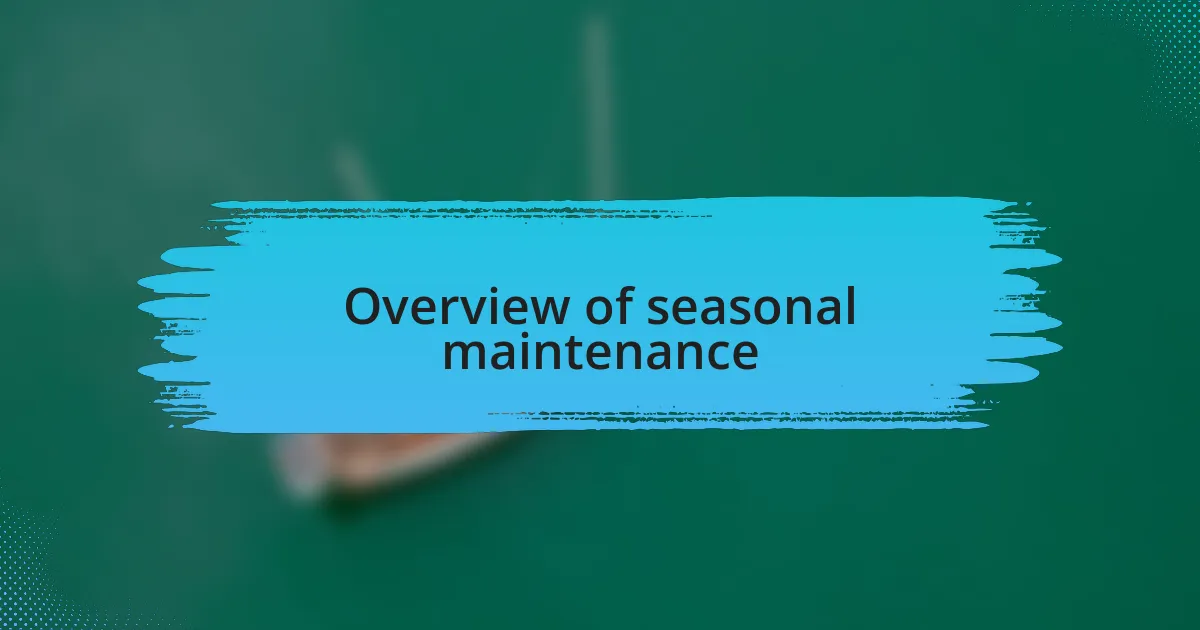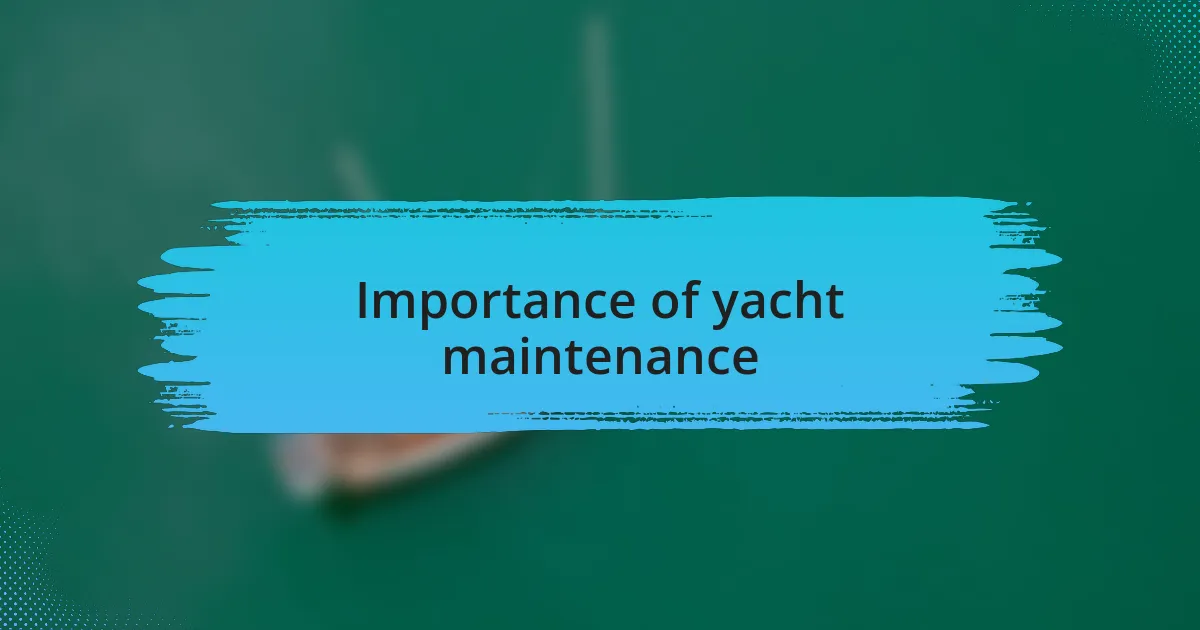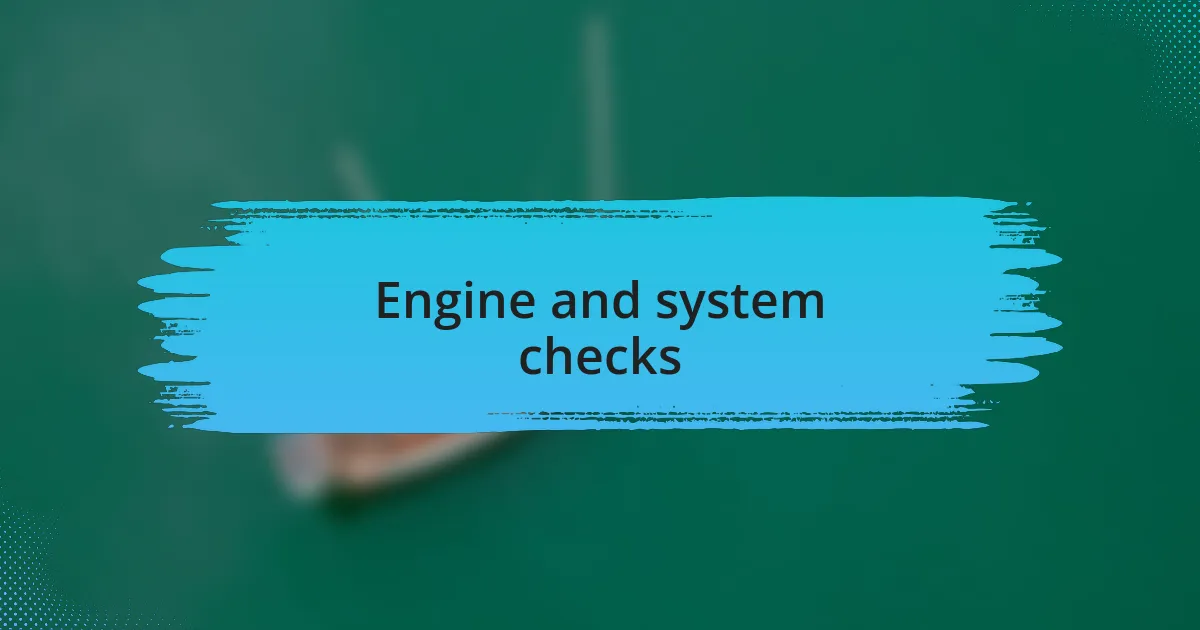Key takeaways:
- Seasonal maintenance enhances yacht performance, safety, and resale value, making it essential for every owner.
- Creating a detailed checklist and scheduling inspections around boating seasons can help identify potential issues before they escalate.
- Regular cleaning and detailed inspections of both the exterior and interior preserve the yacht’s elegance and functionality.
- Keeping a maintenance log and involving professionals for complex repairs are effective strategies for successful yacht upkeep.

Overview of seasonal maintenance
Seasonal maintenance of luxury yachts serves as a crucial responsibility for every owner. I still remember the first time I prepared my yacht for the off-season; it felt like tending to an old friend. The process not only protects the vessel but allows me to appreciate its craftsmanship and the adventures we’ve had together.
Each season brings unique challenges that warrant specific attention. For instance, I always make it a point to inspect the hull closely after winter. Have you ever considered how the weather can affect your yacht? From freezing temperatures that might impact the plumbing systems to sun exposure that can fade finishes, these are factors I learned to account for after a few costly oversights.
Moreover, engaging in a thorough seasonal maintenance routine creates a strong bond between you and your yacht. I find that dedicating time to check every detail, from the engine to the sails, ignites a sense of pride. Doesn’t it feel fantastic to know your yacht is in top shape, ready for your next journey?

Importance of yacht maintenance
Maintaining a yacht isn’t just about keeping it afloat; it’s about preserving a lifestyle and ensuring safety on the water. I vividly recall a summer excursion where a minor engine issue almost turned into a major crisis. That experience taught me how vital regular maintenance is, helping me avoid any unforeseen problems while out at sea. Have you ever found yourself on a trip worried about mechanical failures? Trust me, staying proactive in maintenance can give you peace of mind.
Every component of your yacht plays a significant role, and neglecting any part can lead to larger issues down the line. For example, I used to overlook the importance of regular checks on electrical systems, thinking they could wait. However, after dealing with a power failure during a sunset cruise, I realized that a simple maintenance check could have prevented the headache. It’s those unexpected moments that can ruin an otherwise perfect day on the water.
Additionally, good maintenance practices enhance the yacht’s value over time. Recently, I decided to have my yacht detailed and serviced thoroughly before listing it for sale. The value appreciation from this investment not only surprised me but also reinforced how critical routine maintenance is for anyone intending to own a yacht long-term. Have you thought about how a well-maintained yacht could impact its resale value? It’s an aspect that every passionate owner should consider seriously.

Schedule for seasonal inspections
Scheduling seasonal inspections for your yacht is essential to maintaining its performance and longevity. Personally, I’ve learned that timing these inspections based on the boating season can make a significant difference. For instance, I always schedule mine just before summer, as this ensures everything is in tip-top shape for those long, leisurely days on the water.
When planning inspections, I recommend matching them with the end of your sailing season as well. I recall how I almost missed a crucial boat check after a busy summer. It was only during a routine winterization that I discovered a small leak in the hull that could have turned disastrous if left unchecked. Isn’t it comforting to know that with proper scheduling, you can catch these issues before they lead to major repairs?
Ultimately, I find that creating a detailed checklist can simplify the inspection process. I’ve crafted my own list, including areas like the engine, hull, and safety equipment, ensuring I never overlook any critical component. Do you have a checklist? Having a structured approach not only eases the maintenance burden but also gives me confidence that my yacht is ready for whatever adventures lie ahead.

Key tasks for seasonal upkeep
Maintaining your yacht through key seasonal upkeep tasks is crucial for preserving its elegance and functionality. From my experience, one of the first things I tackle is cleaning the exterior. There’s something deeply satisfying about scrubbing away salt and grime after a long season. It not only makes the yacht sparkly and inviting but also helps to spot any potential wear or damage that might need attention.
Beyond cleaning, I take time to inspect the sails and rigging, which I find can easily be overlooked. I remember one season, I neglected to check the halyards and discovered a fray that could have put a damper on a thoughtfully planned sailing trip. That moment taught me the importance of vigilance; little checks can prevent large headaches down the line. Have you ever faced a similar experience where a small oversight turned into a big issue? It’s a reminder that every detail counts in maintaining the luxury of your vessel.
Lastly, I prioritize the engine and mechanical systems as a fundamental aspect of seasonal upkeep. I like to think of my yacht’s engine as its heart; ensuring it’s in good condition means peace of mind on the water. Just last season, I performed a thorough oil change and filter replacement, which led to a noticeably smoother ride. This process may seem tedious, but trust me, the joy of reliable performance makes it all worthwhile. Have you established a personal routine for engine checks? Creating yours might just transform your journeys at sea.

Cleaning and detailing practices
Cleaning the deck is something I consider essential—it’s where every gathering happens, and a spotless deck creates an inviting atmosphere. I always start with a heavy-duty wash to remove persistent stains and algae buildup. I recall one summer when I decided to test a new eco-friendly cleaner; not only did my deck shine like new, but I also felt good about protecting the marine environment. Have you ever tried a product that exceeded your expectations?
When it comes to detailing the interior, I like to focus on every nook and cranny. From vacuuming the upholstery to polishing the wood finishes, the goal is to ensure that everything feels luxurious and well cared for. I remember a time when I neglected to clean the galley properly, which left a lingering smell during a weekend getaway. It was a valuable lesson in maintaining comfort aboard; a clean yacht truly feels like a home away from home.
Lastly, I always refresh the windows and portholes for that crystal-clear view of the horizon. There’s something about seeing the sun glint off the water, unobstructed by grime. I once used a special glass cleaner that not only left the surfaces streak-free but also protected against salt buildup, extending the lifespan of the glass. Have you found any particular products or methods that have made a difference in your cleaning routine? Sharing tips can elevate the experience for all of us enjoying life on the water.

Engine and system checks
Regardless of how often I use my yacht, engine and system checks are a non-negotiable part of my routine. Before each season, I meticulously inspect the engine components, ensuring everything from the oil levels to the fuel filters is in perfect condition. I can’t emphasize enough how a small oversight can lead to bigger issues; I’ve learned that lesson the hard way when a neglected oil change resulted in a costly repair bill.
While checking the engine, I also pay close attention to electrical systems, including batteries and wiring. I recall a particular trip where I had neglected to check the battery’s charge and found myself stranded at anchor when the electronics failed. The quietness of that moment was stark, and it served as a powerful reminder of the importance of preventive checks. Have you ever been caught off guard like that?
Additionally, I always run diagnostic tests on the navigation and communication systems. Ensuring that everything works seamlessly can make a huge difference in how safe and enjoyable my time on the water is. I remember a voyage where my GPS malfunctions turned a straightforward route into a stressful guessing game. That experience taught me to treat each system check as if my safety depended on it—and honestly, it does. What about you? What are some of your go-to techniques when it comes to ensuring that everything runs smoothly?

Personal tips for effective maintenance
When it comes to effective maintenance, I’ve found that documenting every detail is paramount. I keep a maintenance log where I jot down every inspection and repair I perform. This habit has saved me more than once; I remember a time when my engine started showing signs of wear. Thanks to my records, I could refer back and pinpoint when the last major service was conducted, allowing me to address the issue before it escalated into a breakdown. Have you thought about how a simple log can save you time and money?
Another tip I swear by is to schedule maintenance tasks in advance. I set reminders for seasonal checks well ahead of time, ensuring I’m not scrambling when the weather turns perfect for sailing. There was a summer when I neglected to check the anti-fouling paint on my hull. The result? A frustratingly slow sail due to barnacle growth. That experience taught me that proactive planning keeps the stress levels down and the enjoyment levels up. How do you keep your maintenance organized?
Lastly, I can’t stress the value of involving professionals for specialized tasks. While I handle most checks myself, I always consult a marine technician for complex systems like plumbing or HVAC. On one occasion, I tried to fix a leak in the freshwater system, thinking it was a simple issue. It turned out to be a significant problem that required expert attention. Working with professionals not only ensures the job gets done correctly but also gives me peace of mind knowing I’m maximizing my yacht’s performance. Have you found situations where bringing in an expert made all the difference?